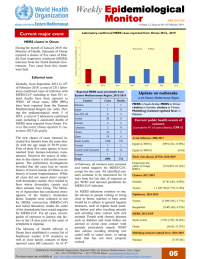WHO EMRO Weekly Epidemiological Monitor: Volume 12, Issue 5 (3 February 2019)
MERS cluster in Oman
During the month of January 2019, the Ministry of Health, Sultanate of Oman reported a cluster of five cases of Middle East respiratory syndrome (MERS) infection from the North Batinah Governorate. Two cases from this cluster were fatal.
Editorial note
Globally, from September 2012 to 10th of February 2019, a total of 2311 laboratory-confirmed cases of infection with MERS-CoV including at least 811 related deaths have been reported to WHO. Of those cases, 2096 (90%) have been reported from the Eastern Mediterranean Region (See table). During the epidemiological week 5 of 2019, a total of 5 laboratory-confirmed cases including 2 associated deaths of MERS were reported from Oman. Prior to this event, Oman reported 11 cases since 2013.
The new cluster of cases reported included five females from the same family with the age range of 30-59 years.
Four of these five cases appear to have resulted from human-to-human transmission. However the source of infection in this cluster is still under investigation. The preliminary investigations revealed that the cases had no recent history of travel outside of Oman or no history of recent hospitalization. While all cases did not report direct contact with dromedary camels, they resided in farm where dromedary camels and other animals were living. The Ministry of Agriculture has conducted investigation of the family’s dromedary farms. Samples were collected to test for MERS coronavirus (MERS-CoV) and initial laboratory results for some of the dromedaries have tested negative for MERS-CoV. For all cases, investigation of exposure to known risk factors in the 14 days prior to the onset of symptoms is ongoing.
The Ministry of Health officials in Oman have established a contact list of healthcare worker (119 contacts) as well as close family contacts of these reported cases (60 contacts). As of 4th of February, all contacts were screened and tested negative for MERS-CoV, except for one case. All identified contacts continue to be monitored for 14 days from the last date of exposure as per WHO and national guidelines for MERS-CoV infection.
As MERS infections continue to rise, the advises to people visiting or living close to farms, markets or barn areas would be to adhere to general hygiene measures, such as regular hand washing before and after touching animals and avoiding close contact with sick animals. People with chronic diseases such as diabetes and renal failure are advised to avoid close contact with animals, particularly camels. WHO also advises avoiding drinking raw camel milk or camel urine, or eating meat that has not been properly cooked.


